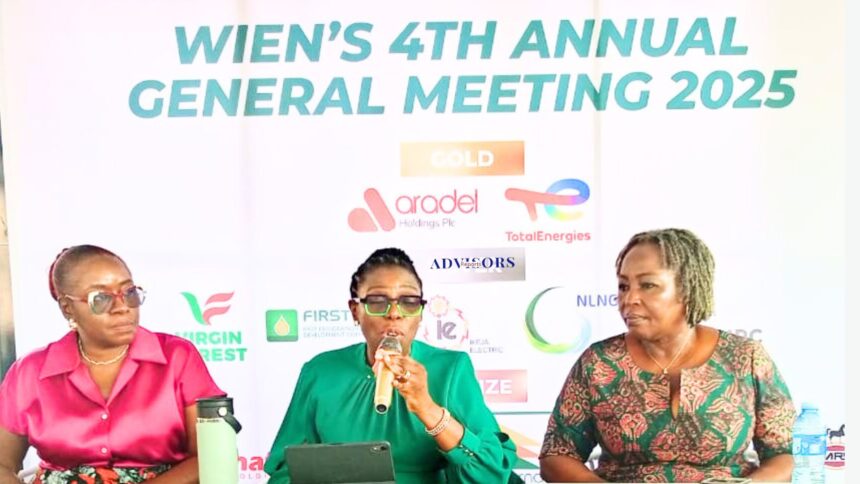… WIEN hits 1,008 members, as TotalEnergies becomes first IOC member
“Women must get 35% representation under Renewed Hope Agenda”- WIEN rallies Tinubu’s S.A on Energy
Oredola Adeola
Eyono Fatayi-Williams has been re-elected as President of the Women in Energy Network (WIEN) for another two-year term, following the conclusion of the 2025 Board of Directors election, to steer the network’s strategic direction.
Also elected to serve on the new Board were Yetunde Odejobi as Vice President, Gas; Ifeoma Ukabiala as Vice President, Upstream; and Ihuoma Chukwuka as Board Secretary.
Others include Dorothy Eboh, Academy Director; Lola Oyenekan, Business Development and Publicity Director; Adebisi Adeola, Finance Director; Rita Obiageli Kwentoh, Sponsorship Director; and Bassey Adie, Conferences and Partnerships Director.
This formed the major highlights of WIEN’s Annual General Meeting held in Lagos on Tuesday, during which the newly elected leaders were confirmed as the successful candidates in the 2025 Board of Directors election.
Earlier during the press conference organised on the sideline of the AGM, Fatayi-Williams stated that the measurable success has confirmed that the Women in Energy Network (WIEN) is now a major force, not just in Nigeria, but globally.
According to her, in 2025, WIEN achieved historical milestones as our membership crossed the 1,000 mark.
“We now stand at over 1,008 members and counting, from a very modest beginning of just 20 members and two corporate members in 2020.
“Our corporate membership has also grown, with Total Energies becoming the first IOC to join WIEN, alongside Aradel, Falcon, NLNG, and 27 others.
“This demonstrates the confidence the industry has in the quality and impact of what WIEN represents,” she said.
The WIEN President stated that the milestone demonstrates the urgent demand for a platform that champions and elevates women’s activities across the energy value chain.
She further said, “Our influence expanded significantly in 2025, securing a global presence at multiple international conferences, proving that Nigerian women in the energy sector are visible on the international stage.
Fatayi-Williams explained that through STEM initiatives, the Network has created a direct and powerful pipeline connecting its collegiate members and other talented women to top corporate partners such as Aradel Holdings and key government agencies.
The President noted that WIEN’s advocacy continues to shape policies and strategic engagements with agencies such as REA and NCDMB.
“We are participating in conversations that define Nigeria’s energy future; we are not just advocating for change, we are driving it.
Fatayi-Williams also confirmed that the Network recently partnered with KPMG to strengthen governance for women-owned institutions in the energy industry.
She said, “This shows that we have what it takes to contribute meaningfully to Nigeria’s energy transition journey. We refuse to sit at the back seat in moving our nation forward.
“We have built a solid foundation from our early days, with two corporate members and 30 founding members.
“Our strategy has always been to grow value within the network; it is not enough to bring people in—there must be reasons to keep them.
“We have strategically developed our collegiate groups in universities, partnered with the Nigerian Gas Association, and conducted over 2,000 webinars and masterclasses for capacity building.
“We recognize that one reason generational businesses have struggled in parts of Africa is due to a lack of corporate governance, which affects sustainability.
“That is why we have coaching and mentoring programs for undergraduates and our members in business, as well as a Young Professionals group to instill our values early on.
The President further noted that in 2025, through NCDMB workshops, WIEN emphasized the need to engage in HR development within oil companies, planning careers for young female engineers in ways that consider their biological realities.
According to her, “This ensures women can contribute meaningfully even during periods like pregnancy and nursing, without being sidelined.
“Women need courage and creativity. They should focus on bringing value to the table rather than playing gender cards,” she said.
Fatayi-Williams further noted that in September, WIEN paid a courtesy visit to the office of Olu Verheijen, Special Adviser to the President on Energy, leading to the development of a database of women-owned businesses that the government can promote, as well as identifying women ready for board and executive leadership positions.
The WIEN President noted that the network is also leveraging the influence of the S.A to the President, who is a member of the Women in LPG Committee and works closely with the Minister of Women Affairs, to advance advocacy for increased female representation under President Bola Tinubu’s Renewed Hope Agenda.
She emphasised that WIEN’s goal is to work with her to implement the 35% inclusion policy in boards of parastatals, similar to how CBN has recognized women as MDs and CEOs in the banking sector.
“This top-down drive will encourage both government and private companies in the oil and energy sector to adopt similar policies,” she said.
Asanimo Omezi, WIEN Executive Secretary, in her comment stated that women in the Network must disrupt the status quo and create the platform we want for the generations to come.
According to her, “The world has shown us that diversity is not something to be spoken about only verbally, it is a strategic direction.
“The outcomes globally have demonstrated how diversity strengthens organizations and improves bottom lines.
“We are driving a good train, and we want to welcome more passengers to take us to our destination.
“Last year alone, we reached over 400 girls between Lagos and Port Harcourt. We showcased what other women in the sector have achieved and encouraged these girls to take STEM seriously, because technical competence in the energy space cannot be compromised. Safety matters, and technical training is important.
“Our young ladies must be interested in STEM.
“We are working not only with girls generally, but specifically with girls in STEM across five secondary schools in Rivers State.
“We encouraged them to buckle up, see the opportunities ahead, and we grew our scholarship portfolio.
We are currently developing a framework to expand our STEM scholarship scheme for outstanding girls—we already have 16 beneficiaries,” the WIEN ES said.
Omezi explained that before the first quarter of 2026, WIEN with its partners will develop a framework in form of business incubation hubs as a unique initiative, to bring all developmental efforts into one basket—a unified platform for women in the energy space.
She said, “A key element is our partnership with academia, including Bonny NLNG, where we are working to build laboratories and upgrade engineering facilities—not only in Rivers State universities.
“This can spread nationwide, benefitting women across the country, including those in solar technology. There is so much we can do for the next generation; the gap between our generation and theirs is huge.
She explained that WIEN, in collaboration with the Office of the S.A to President on Energy, is developing a comprehensive database of women-ready businesses.
She added that the partnership with Ms. Verheijen — a WIEN member and one of its founding members — is focused on bringing real competencies rather than symbolic representation.
According to her, WIEN is identifying existing data gaps and creating capacity-building solutions to close them.
The ES further noted that, through its relationship with the Chartered Institute of Directors, the Network has deliberately supported board-ready women to become credible and viable board directors.
In the power sector, the ES stated that WIEN is ensuring that stakeholders in Abuja and in schools understand the new energy landscape.
“With support from international bodies, we are strengthening our work in solar. We want our women to compete on any stage.
“Many women are now exploring greater opportunities in the renewable energy space, which offers lower barriers to entry compared to the oil and gas sector.
“This is a space where women can set the tone, as strong competition has not yet fully developed,” Omezi said.




